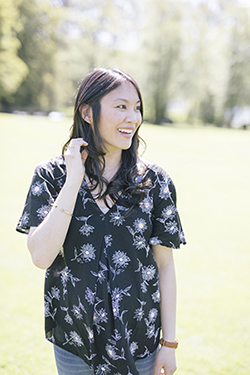Write for the Poem: Quinn Stacey in Conversation with Gillian Sze

Malahat Review volunteer and former work study student Quinn Stacey discusses what it's like to be a judge, the advantages of winning a contest, and the differences in Canadian poetry with Long Poem Prize judge Gillian Sze.
Gillian Sze is the author of nine poetry collections, including Peeling Rambutan and Redrafting Winter, both of which were finalists for the QWF A. M. Klein Prize for Poetry. She studied Creative Writing and English Literature at Concordia University and received a Ph.D. in Études anglaises from Université de Montréal. Gillian has served as a judge for various writing competitions including This Magazine’s Great Canadian Literary Hunt, the National Magazine Awards, and the bpNichol Chapbook Award. Her most recent book, Panicle, was published by ECW Press and is nominated for the QWF A. M. Klein Prize for Poetry. Her current project, a book of essays, is supported by a grant from the Conseil des arts et des lettres du Québec. Originally from Winnipeg, she now resides in Montreal where she teaches creative writing and literature. www.gilliansze.com
Are there any less-obvious advantages that come with winning or being shortlisted for a prize like The Malahat Review’s Long Poem Prize? Have you found that your approach to your work changes at all after winning a contest?
The publicity and exposure is an obvious boon but it’s important to keep in mind that there are so many opportunities for recognition and possibilities of engagement with a work. The contest is just one of them. Having your work read carefully, appreciated, and made prominent is no doubt validating and an honour. Enjoy the win, but remember that the readership is beyond the jury, and beyond that moment of winning. Your reader is also someone who has taken your book out at the library, or delighted in hearing you read somewhere, or shared your work with a friend. It may be a student who wants to write because of you. It’s someone who feels less alone because of your words.
Have you found your writing practice changes when you’re preparing to submit new work to a prize or contest?
Not really: I think it’s most important to stay true to the poem’s intent and to respect its needs. Write for the poem. Not for the judges.
As somebody who lives and works in Montreal, and judging a contest for a magazine based on the West Coast, would you say that Canadian poetry is unified stylistically from coast to coast?
Canadian poetry can’t be stuffed in any box. When I was reading all of the chapbooks published in Canada last year for the bpNichol award, I was astounded by the range of subjects, voices, and experiences. I was also happy to discover new presses, especially those that stretched the confines of the chapbook form.
This is not your first time judging a poetry contest. Have you learned anything about the judging process since your first experience? Has your own work benefitted from judging the work of others?
Serving on a jury means negotiating with your fellow jurors. Everyone reads differently: we each come to the table with our own desires, tastes, experiences, and opinions of what constitutes as “winning.” In fact, rarely has my first pick been the overall winner. It’s always a collaborative and difficult process when deciding on a shortlist and winner to which each juror can accede.
When I’m on the other end of things, I remind myself of this. The make-up of one jury may share strong creative affinities with a submission. And it may not. You just never know how things will go.
What are a few things you look for in a winning long poem?
I look for allure, surprise, and memorability. I like work that strikes that balance between technical strength and the ineffable power to move the reader. I like to leave a poem with a sense that I learned or felt something I didn't when I started.
Quinn Stacey
* * * * * * * *









